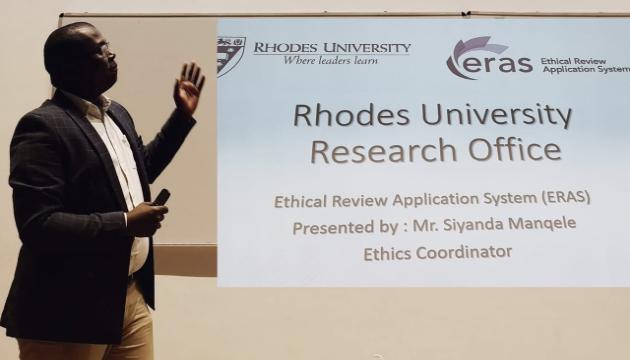
Jack Tilbury
M.Comm (Information Systems) student
The issue of ethics is increasingly foregrounded in research design. The extent to which this demonstrates a deepening concern with ethical processes or whether it reflects the increased bureaucracy in a risk-averse era can be debated. Either way, students need to understand what is expected of them before they can get the ethical clearance required for data collection.
While there exist certain honours, master’s, and doctoral studies that involve course work – a key component of all postgraduate degrees is conducting research and submitting a research paper. During research, students will typically collect and analyse data from the various fields in which they operate. In carrying out this collection and analysis of information the researcher must be ethical. This entails being transparent, lawful, and respectful.
On the 14th March, the Centre for Postgraduate Studies (CPGS), administered by Prof. Sioux McKenna, held their third event of the year. The event, titled “Ethics Principles in Practice” was led and presented by newly appointed Ethics Coordinator of Rhodes University, Mr Siyanda Manqele. In a 90-minute presentation, with a respectful audience of postgraduate scholars, Mr Manqele discussed the role of the ethics committee, the newly employed ethics system, and attended to a variety of hotly debated questions from members of various faculties.
The negative stigma towards the ethics committee was highlighted and an emphasis was placed on the fact that the committee is in place to protect researchers and participants from unlawful practices when collecting and analysis information. The National Health Research Ethics Committee (NHREC) oversees human and animal research in all 26 South African universities. This raised concerns as the NHREC is primarily concerned with medical research and there are often tensions between the ethical considerations of medical studies and those in other fields. Mr Manqele addressed these concerns by saying that we need to speak back to any disjuncture between what is being called for and what we are planning to do in research.
The pinnacle of the event was the introduction of the new ethics system at Rhodes – Ethical Review Application System (ERAS). ERAS offers a collaborative platform for scholars, supervisors and ethics committee members with the aim of streamlining the application process resulting in quicker turnaround times. The system presents itself as an easy to use platform which is accessible to all registered Rhodes members from any location. It is accessible from this link:
https://www.ru.ac.za/researchgateway/ethics/
Questions were abundant as students from various faculties raised their concerns and worries with regards to the system and the process as a whole. Mr Manqele, however, reassured everyone of his support and answered all topics of discussion while still managing to entertain the crowd with his sense of humour. Going forward, the ERAS platform should assist both postgraduate scholars in making the ethics process one that is smooth in operation.
